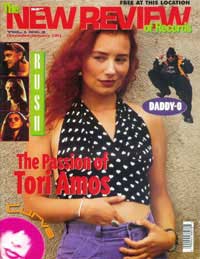Rush: Closer To The Heart
By Paul Semel, The New Review Of Records Vol. 1 No. 3, December/January 1994, transcribed by pwrwindows

Rush guitarist Alex Lifeson isn't sure if bandmate Neil Peart is in love or not. Peart has written about love in the band's poetic lyrics since joining in 1975 for the second album Fly By Night, but love nas an even stronger presence on their newest masterpiece, Counterparts (Anthem/Atlantic). "It's certainly mentioned a lot more," Lifeson says, "but it's the camera balance of different types of love and how it applies in different kinds of relationships." So he wasn't skipping around the room? "Ah, no."
Not that anyone would fault Peart for a few joyous jumps, as Counterparts is another amazing album in an already impressive canon. The Jazz-like precision with which the band mixes Peart's multi-layered drumming, Lifeson's textural guitars, and Geddy Lee's unique vocals, atmospheric keyboards, and slap bass has influenced such diverse musicians as Primus and Metallica, and Counterparts continues the grand tradition. With songs such as "Cut to the Chase" and "Stick it Out" featuring Lifeson's heaviest guitar work since 1976's 2112, the new album finds the trio concentrating more on the guitars, basses, and drums, rather than the keyboards that peppered its most recent albums.
Lifeson does his own joyful dance, if only verbally, when thinking about Counterparts. "This is the first record since Moving Pictures that I get the same sense that it's well-balanced, and that there are no really weak spots." Musicians are prone to compare their latest album to their greatest success, but Lifeson doesn't make his comparison lightly. "I always feel there are weak spots on a record, and that's important because it drives you to make it better the next time, but I don't really hear any on Counterparts."
"There are certain aspects that do touch back to our past," he continues, "and that's something we were very aware of and consciously wanted to do. It wasn't that we wanted to make Moving Pictures again, but we had been so busy trying to develop our music that we forgot about the excitement and energy of playing as a trio; we lost the whole essence of what it was all about, the fun of being in a Rock band. And I think we recaptured it with this record.
The fun of Rush's earlier albums led many a suburban kid to pick up an instrument - Peart is one of the more influential drummers of the last two decades - but Lifeson doesn't hear his group's effect on others, though he's got an excuse. "It's difficult for me to really tell what we sound like."
Take the music of admitted Rush addicts Primus, who not only toured with their heroes but also spent many an afternoon jamming wildly. (We won't mention Primus bassist Les Caypool and Lifeson getting drunk in the latter's home studio.) "I think they might have been influenced by us as a band, as what you can accomplish if you stick with your guns and go with what you believe in musically," Lifeson says, "but I think in terms of the music itself I don't really hear the similarities."
Counterparts also proved to be, in some ways, an easier album to make. "After so many years, we just do it better than we used to." the baby-faced guitarist admits. "We're better prepared and have a better way of working, so all the hard work is done at the writing stage, and when we record, it's just a matter of going in and playing." Even so, they still find themselves needing an outside producer. As Lifeson concedes, "We sort of need a referee. We all have our own ideas on how the record should be done - that's why it takes us quite a while to make one. It's a very democratic arrangement in this band: Unless we all feel strongly about something together, it doesn't usually happen. And when it comes to mixing, when three people hear it, someone has to finally say, 'Okay guys, this is it,' and I think that's important for us."
Not that everything went smoothly: "Some of the lyrics were very difficult to work with in musical terms," says Lifeson, who writes the music with Lee. "We read through the lyrics and get a sense of what the mood is and we write the music accordingly. But with this particular record Geddy and I both had a really hard time, and there were many rewrites, more so than ever in the past. And there were five or six songs that just went back into Neil's file."
All difficulties aside, Counterparts once again proves that Rush is still miles ahead of where anyone else will be this decade. And while Lifeson, Lee, and Peart may not be skipping around the room, there are a few momentary lapses of maturity they'd allow themselves. "I would do a video just to be on Beavis & Butthead. That would be cool."